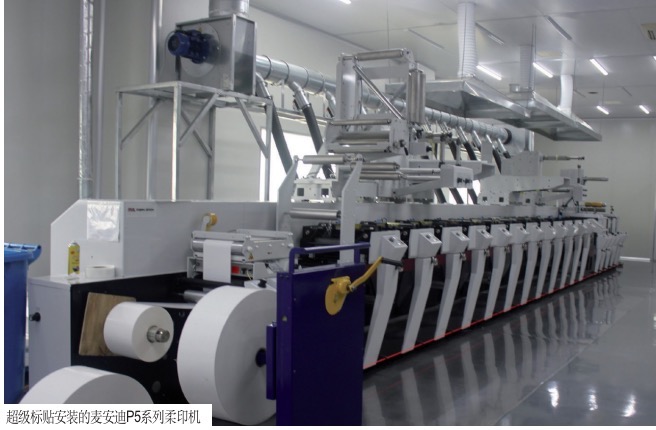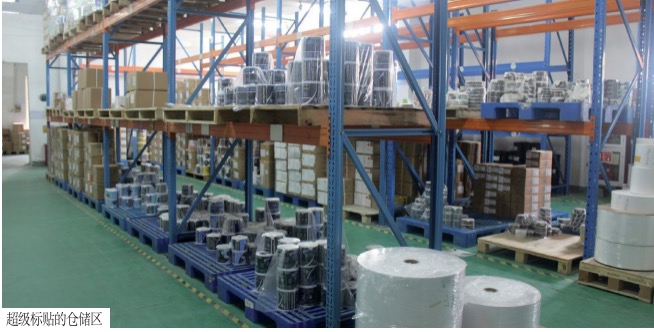Located in Songjiang Sheshan Industry Park, Shanghai, Super Labels was established in 2002 as a wholly-owned subsidiary of Super Group, one of Malaysia’s oldest self-adhesive label converters and a manufacturer of labeling machine systems. In 2012, Super Labels was acquired by Xiamen Anne Corporation which has continued to focus on self-adhesive label production. Super Labels’ operation has since been expanded to a floor area of 3,000sqm with an annual output exceeding 100 million Yuan (USD $14.7m). Its key customers include major international brands such as BP, Fuchs, Bosch and Bacchus, and leading domestic brands such as Lopal Tech. In addition, the company has obtained a range of certifications, including UL, ISO9001:2015 and ISO14001:2015 quality management systems and environmental systems certification.
Dai Lianghu is general manager of Super Labels, and takes a realistic view of current market developments in China: ‘From an overall view, the label market has passed its high growth point when demand exceeded supply, and profit was relatively easy to come by. In recent years we have seen serious market consolidation and the squeezing of profit margins, with companies entering what we call the ‘bottleneck period’. In my opinion, this is a necessary stage of industry development, and has pushed us towards a transition and upgrade in our enterprise.’ So how has Super Labels adapted? Firstly, by a major process of capital investment in more productive and efficient press technology. In 2014 Super Labels purchased a Gallus ECS340 flexo press to add to its existing EM280, and this was followed by an Omet XFlex X4 flexo press in 2015 and a Mark Andy P5 flexo press in 2018. ‘Gallus, Omet and Mark Andy are all world-leading brands and we are confident about their product quality and after-sales service,’ says Dai Lianghu. ‘There is a popular saying in China, “Drive BMW, and ride Benz”. This means the BMW vehicle emphasizes a pleasurable driving experience, while the (Mercedes) Benz gives both an excellent driving experience and riding comfort. Just like these vehicles, the presses of each brand have their own advantages. By building such diversified production facilities, we can explore the potential of each machine to produce more creative products and bring a richer product experience and value-added effects to our customers.’ Today flexo production accounts for 70 percent of Super Labels’ total production volume. In October 2018 the company took its first steps into digital by ordering an HP Indigo 6900. For the next stage, Super Labels will explore hybrid digital + flexo technology to provide ‘a better and richer product experience for customers.’
People first
The transition for Super Labels has not just been about technology, but also developing and empowering its employees. ‘With our new advanced production facility we have not merely upgraded our enterprise hardware,’ says Dai Lianghu. ‘The key requirement for the company’s progressive growth is people, that means we need to develop more thoroughly and profoundly our soft power in all its aspects.’

This led Super Labels to establish a ‘People First’ talent training, promotion and incentive program, which includes regular skills training, sharing new technology insights and a strict post-appraisal system. Super Labels’ talent strategy covers two aspects. One is ‘promotion’, which assigns the important posts to the most experienced and competent employees and allows them to explore their fullest potential; the other is ‘introduction’, which aims to recruit creative high-tech talents and inject flesh blood into the company’s development.
At present, Super Labels employs six senior engineers and MBA-qualified managers, along with a dozen manufacturing technicians and other technical employees. Indeed, technical personnel account for more than 20 percent of the company’s total headcount.
The development of this ‘soft power’ approach has allowed Super Labels to cut its employee numbers from over 170 to 100 while still increasing productivity and profitability. ‘Having an advanced talent cultivating mechanism and creating space for individual development are helpful in enhancing employees’ loyalty to the company,’ says Dai Lianghu. This is confirmed by HR manager Xi Hong: ‘Our employeeturnover rate is quite low, and above 8-year employees like me can’t even be regarded as “old” here!’ Many of Super Labels’ employees have been working at the company for 7-10 years. ‘It has taken a lot of management effort to build a soft power system which retains the trust of older employees while allowing new employees the space to progress, and ensuring all employees have access to constant learning and feedback.’

Automation pathway
Cost control and efficiency are key requirements for a profitable business, and today’s industrial-scale automated control systems allow these objectives to be achieved. Therefore, alongside its investment in automated printing machines, Super Labels has also automated its pre-press and post-press quality control operations. Pre-press automation includes image optimization and color management, while investment in Rhyguan, AVT and several Luster in-line/off-line inspection facilities has enabled automatic inspection and control of product quality. ‘The introduction of automation not only substantially increased our productivity but also effectively controlled manufacturing costs,including materials, energy and labor costs,’ says Dai Lianghu. Luster’s LabelRoll-H series off-line inspection systems, for example, can efficiently identify and locate a wide range of print defects including missing print, deckle, mis-registration and improper position of stamping and die-cutting tools, making it ideal for quality control of self-adhesive labels for pharmaceutical, food, household chemical and electronics labels. After inspection is completed, the system automatically generates a defect classification report, from which operators can statistically analyze and process the detected defects. A strategic cooperation program between Super Labels and Luster commenced in 2014 when the converter’s single AVT off-line inspection machine did not have the capacity to meet growing production volumes. ‘We needed to add a personalized automatic inspection system which would allow us to process a wide variety of order types,’ says Dai Lianghu. ‘We chose the Luster label inspection system after a thorough investigation and repeated trials. Luster custom-made its products for us and their service levels have certainly satisfied our demands. Before and during the installation, we kept in communication and exchanged technical views with Luster on a regular basis.’ Explains Luster LightTech Group’s East China regional sales director, Li Linghua: ‘Automatic inspection systems convert conventional experience into systematic knowledge in a way that is useable in field applications. We join hands and learn from each other to make mutual progress. Super Labels has very rich practical experience in label production, from which we can understand the label printers’ demands for an automatic visual inspection system and the potential difficulties encountered during the inspection process. At the same time, Super Labels can double check the inspection performance of Luster’s products during the production process. Therefore, it is of great significance for Luster’s R&D for both new products and new technology development.’ Li Linghua says that in the same way manual operators need time to accumulate experience and knowledge, automated machinery also requires a constant learning and improvement process. ‘In the next phase, we will investigate the automatic prevention of production issues which cause defective labels based on feedback from the data we are now gathering,’ says Li Linghua. ‘Super Labels and Luster have definite future plans to work together towards this objective.’

